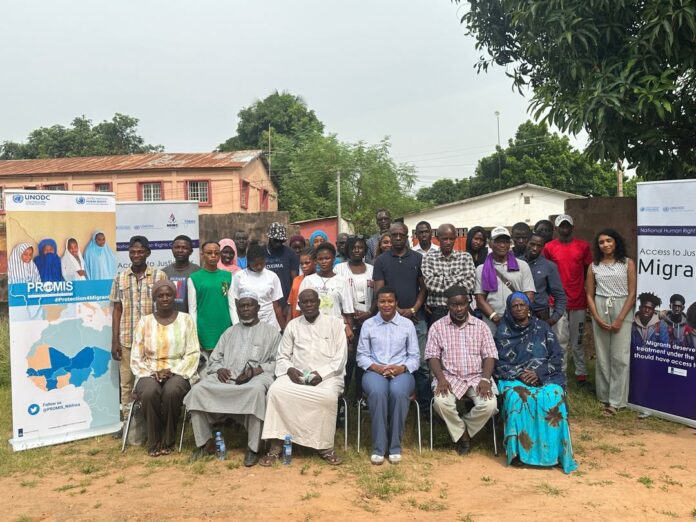By Alieu Jallow
In a concerted effort to enhance legal protections and increase societal understanding of migrant rights, the National Human Rights Commission (NHRC) concluded a comprehensive five-day community outreach program on Friday, October 25, 2024. The program focused on improving access to justice for migrants, targeting key migrant settlements such as Tanji, Bakau, Gunjur, Brikama, and Bundung. The outreach brought together legal experts, university law students, social activists, migrants, and community members for meaningful dialogue about the challenges faced by migrants in accessing justice.
Funded by the Kingdom of the Netherlands, the PROMIS project is a joint initiative by the Office of the High Commissioner for Human Rights (OHCHR) and the United Nations Office on Drugs and Crime (UNODC), aimed at strengthening the capacity of West African states to adopt a human rights-based response to trafficking in persons, smuggling of migrants, and related crimes. The project also focuses on addressing human rights violations associated with irregular migration.
Lamin Njie, a program officer at the NHRC, outlined that the overall objective is to raise awareness about the rights of migrants in communities. He emphasized the importance of communities respecting and upholding these rights, noting that many violations against migrants are perpetrated by community members in the areas where they reside.
“It is very important for community members to be aware of their roles and responsibilities in promoting and protecting the rights of migrants in The Gambia,” he explained.
While migrants continue to face significant barriers when seeking justice, Mr. Njie added that many are unaware of their legal rights. Others face language barriers, fear of deportation, denial of documentation by immigration officers, and systemic discrimination. He is, however, optimistic about a shift in mindset toward migrants’ situations in the country.
“We want to ultimately see the rights of migrants promoted and protected in this country as migration concerns are addressed,” he added.
Ruth K. Taylor, a participant in the program, expressed her delight at being part of the activity, sharing her intention to use her platform in pageantry to raise awareness on migrant issues.
“I’m planning to compete for Miss Gambia next year, and if I do, I don’t mind bringing this topic to my platform because it needs to be addressed in society. I want to send a message out there that I am willing to champion the cause of migration so that people can be aware of migrant rights,” she shared.
Muhammed Sundifo, a migration activist from Sierra Leone residing in The Gambia, expressed gratitude for finding the country a safe haven. He acknowledged that the training has broadened his understanding as a migrant and an activist, equipping him to better advocate for his fellow migrants’ rights.
“This program deserves kudos to the NHRC for this initiative. I’ve learned a lot and am happy to work with them as a human rights activist. This was an opportunity I had longed for, and now I am more eager to work effectively,” he stated.
Kahbila Mbuton, PROMIS Program Officer, reaffirmed their commitment to upholding and promoting migrant rights.
“The Office of the High Commissioner for Human Rights values the relationship with the National Human Rights Commission. We remain ready and committed to working with all our partners in the quest for human rights and access to justice. We want to prioritize community engagement and emphasize the importance of migrant access to justice.”
While this five-day initiative has laid the groundwork for future advocacy, the journey toward equitable treatment for all, regardless of origin, remains a shared responsibility. The NHRC believes this initiative signals a shift toward a more inclusive approach to human rights in the nation, marking a crucial step toward dismantling the barriers that hinder migrants from accessing justice.




